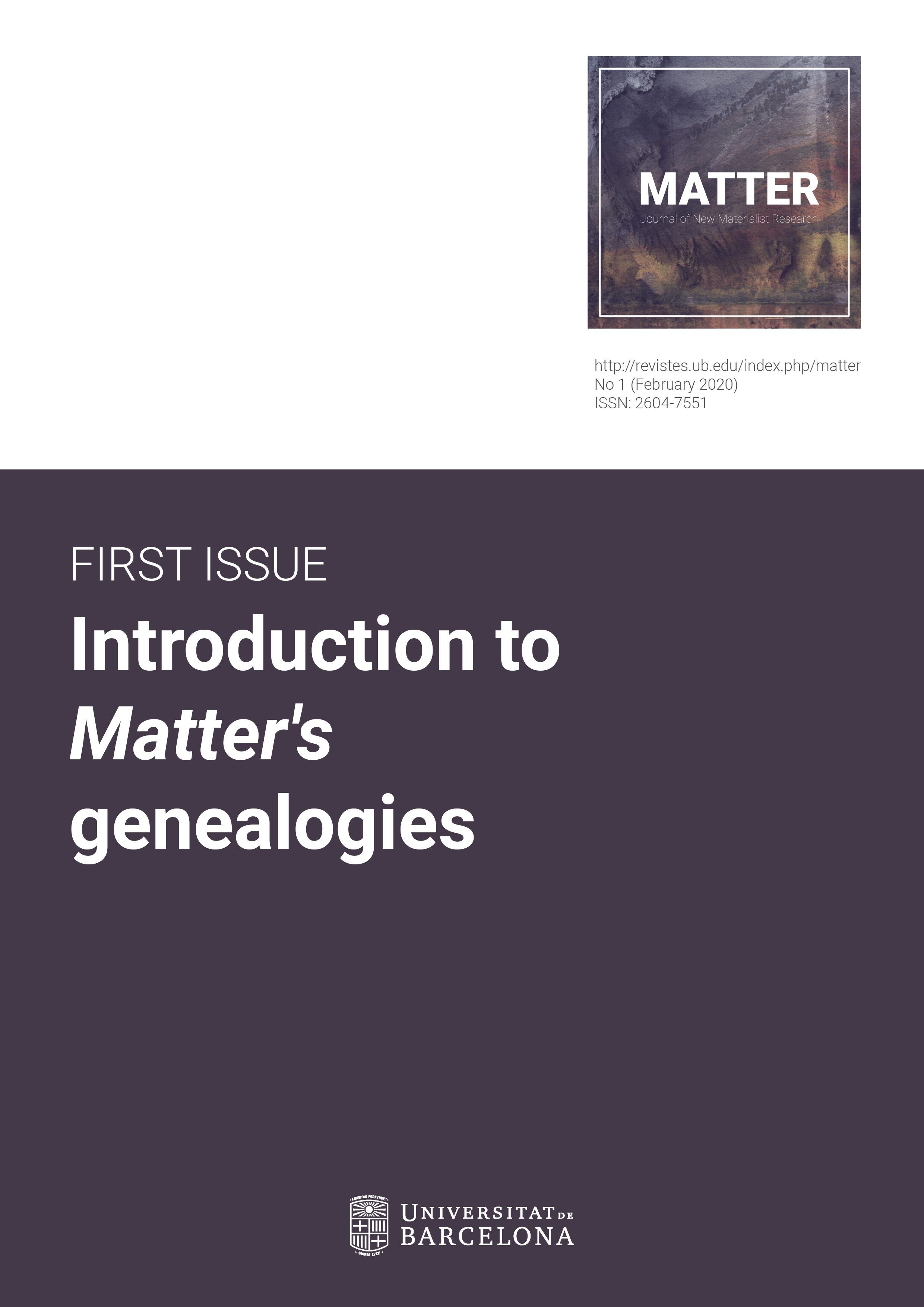New Materialist Becomings and Futurities: A Panel Intra-view
DOI:
https://doi.org/10.1344/jnmr.v1i1.30132Abstract
Derived from Karen Barad’s intra-action, the term intra-view aims to do justice to the continuous process of becoming that is evident in the asynchronous, generative dialogue of this panel. This panel intra-view provides readers with the opportunity to think with the participants, Fernando Hernández-Hernández, Iris van der Tuin, Nathalie Sinclair, Olga Cielemęcka and Monika Rogowska-Stangret, and their encounters and engagements with new materialism, and how they in turn affect our scholarship.Downloads
References
Ahmed, Sara (1998). Differences that matter: Feminist theory and postmodernism. Cambridge, UK: Cambridge University Press.
Ahmed, Sara (2013). Strange encounters: Embodied others in post-coloniality. Routledge.
Barad, Karen (1996). Meeting the universe halfway: Realism and social constructivism without contradiction. In L. H. Nelson & J. Nelson (Eds.), Feminism, science, and the philosophy of science. Dordrecht, Kluwer Press (pp. 161-94).
Barad, Karen (2007). Meeting the universe halfway: Quantum physics and the entanglement of matter and meaning. Durham and London: Duke University Press.
Barad, Karen (2014). Diffracting diffraction: Cutting together-apart. Parallax, 20(3), 168-187.
Braidotti, Rosi (2010). Nomadism: Against methodological nationalism. Policy Futures in Education, 8(3-4), 408-418.
Butler, Judith (1997). Excitable speech: A politics of the performative. New York: Routledge.
De Freitas, Elizabeth (2017). Nonhuman findings from the laboratory of speculative sociology. Minnesota Review, 88(1), 116-126.
Dolphijn, Rick & Van der Tuin, Iris (2012). New materialism: Interviews & cartographies. Ann Arbor, MI: Open Humanities Press.
Greene, Jennifer C. (2013). On rhizomes, lines of flight, mangles, and other assemblages. International Journal of Qualitative Studies in Education, 26(6), 749-758. https://doi.org/10.1080/09518398.2013.788763.
Haraway, Donna (1988). Situated knowledges: The science question in feminism and the privilege of partial perspective. Feminist studies, 14(3), 575-599.
Haraway, Donna (1997). Modest_Witness@Second_Millenium. FemaleMan©_Meets_Oncomouse™. Feminism and Technoscience. New York – London: Routledge
Harding, Sandra (1986). The science question in feminism. Milton Keynes: Open University Press.
Macgilchrist, Felicitas; Allert, Heidrun & Bruch, Anne (2019). Students and society in the 2020s: Three future ‘histories’ of education and technology. Learning, Media and Technology, 1-14.
Puig de la Bellacasa, María (2012). ‘Nothing comes without its world’: Thinking with care. The Sociological Review, 60(2), 197-216.
Rancière, Jacques (2004). The politics of aesthetics: The distribution of the sensible. Translated by Gabriel Rockhill. Continuum.
Tsing, Anna (2012). Unruly edges: Mushrooms as companion. Environmental humanities, 1(1), 141-154.
Van der Tuin, Iris (2015). Generational feminism: New materialist introduction to a generative approach. Maryland: Lexington Books.
Gerrard, Jessica; Rudolph, Sophie & Sriprakash, Arathi (2017). The politics of post-qualitative inquiry: History and power. Qualitative inquiry, 23(5), 384-394.
Downloads
Published
Issue
Section
License
The authors who publish in this journal agree to the following terms:- Authors retain copyright and grant the journal the right of first publication.
- Texts will be published under a Creative Commons Attribution License that allows others to share the work, provided they include an acknowledgement of the work’s authorship, its initial publication in this journal and the terms of the license.






